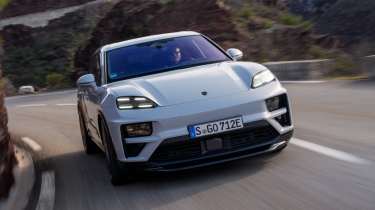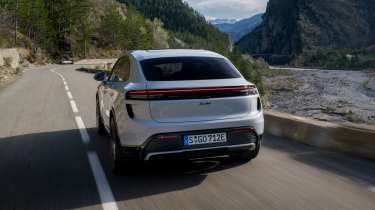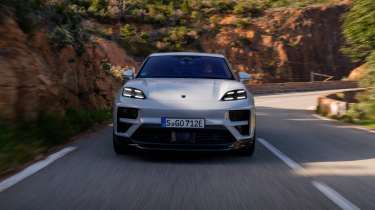New Porsche Macan Electric review – still the driver’s choice for SUVs?
The Porsche Macan has gone electric for its second generation – we've driven it in base form and £95k, 630bhp Turbo guise
Don't be fooled by the familiar name; the second-generation Porsche Macan represents something entirely new. Not only has it gone fully-electric, it’s the first Porsche to be underpinned by the brand new Premium Platform Electric architecture – co-developed with Audi – that will underpin future EVs from the company. The original Macan was an emphatic success both in terms of execution and popularity, and the early signs are that this new version has all the tools to lead the way for premium SUVs once again.
Four-wheel drive, 630bhp Porsches are usually called 911 Turbos, but the flagship Macan Turbo packs this kind of heavyweight punch beneath its new, slightly awkward looking fastback body. Like the Taycan, the Macan’s platform runs on an 800-volt system to benefit charging speeds (270kW, with a 10 to 80 per cent top up taking 21 minutes) and temperature management, and there’s a 95kWh battery mounted in the floor to deliver a 381-mile WLTP range in the entry-level Macan 4, and 367 miles in the Turbo.
Activate Launch Control and the 4 delivers its maximum outputs of 402bhp and 479lb ft, good enough for a 0-62mph time of 5.2sec. The Turbo, meanwhile, gets a beefier rear motor for peaks of 630bhp and 833lb ft, slashing the 62mph sprint down to just 3.3sec – a full 1.2sec faster than the petrol-engined Macan GTS. Porsche is keen to stress that there’s substance beyond these numbers, though, and the Macan’s PPE architecture has been designed to deliver the kind of feel and involvement you’d expect from one of its products.
More reviews
The Macan’s chassis systems are a bit of an acronym fest: it’s offered with ePTM (Porsche Traction Management), dual-valve PASM (Porsche Active Suspension Management) dampers and the Turbo gets PTV Plus (Porsche Torque Vectoring Plus). The latter adds an electronically-controlled locking differential on the rear axle and helps bring the chassis alive, as we’ll discuss later. Air springs and adaptive dampers are optional on the 4 and standard on the Turbo (rear-steer costs extra on both), and the latter’s rear motor is directly mounted to the body and positioned behind the back axle. Sound familiar?
Before you get excited, the new Macan doesn’t drive like a 911, but that’s not to say it doesn’t feel like a Porsche. It starts with the steering; the responses are calm, clean and precise, and as you wind on lock, the speed of the rack gradually quickens to pivot the car into corners. The brakes, meanwhile, are firm and easy to modulate, and actually have a more positive initial response than the Taycan. There’s real finesse to every touch point.
Somehow, despite weighing a faintly ridiculous 2405kg in Turbo form, the Macan carries through that sense of athleticism when you up the pace. You’re aware of the huge forces involved, but it changes direction like a lighter car (particularly with the dampers set to Sport Plus), quickly settling on its springs and leaning into the available grip from the tyres. Traction is superb and you can cover ground extremely quickly – the limiting factor tends to be how long your stomach can cope as 630bhp squeezes your insides between corners (we lasted about 15 minutes).
You need to commit hard – really hard – to push through the sure-footed security in the chassis. When you do, the Macan’s resolute front-end can start to fade and it doesn’t stay completely locked on line at speed, but take a slow-in-fast-out approach and it gives you more options. With its locking rear diff, the Turbo allows you to get on the power really early out of tight corners, taking a neutral attitude where you’d normally expect the front end to push. Work through this and the balance neatly transitions to oversteer, the rear tyres continuing to dig in and find drive but requiring a flick of corrective lock. Not very crossover-like, and quite entertaining.
It's worth saying that without the Turbo's torque vectoring rear drive unit, the Macan 4 doesn't reward in the same way; the transition between grip and slip is scrappier and less predictable so there’s less incentive to work the chassis. The Turbo isn't exactly a thriller, but more Porsche DNA comes through the harder you drive it. We also didn’t get to try a Macan on steel springs without the optional chassis gizmos, so whether this dynamic ability extends to the basic car remains to be seen.
Both the 4 and Turbo have fantastic bandwidth in normal driving, though. The firm and occasionally choppy low speed ride becomes sumptuous and settled at a cruise, and noise isolation is up there with the very best in the class. The BMW iX is more impressive in its ability to cushion its occupants from the road, but covering distance in the Porsche is still very relaxing, and some sports cars will struggle to stick to its bumper on a challenging road. Both Macan models have the instant snap and flexibility we’ve come to expect from fast EVs, with the Turbo being genuinely rapid and the 4 delivering softer, less explosive acceleration.
For most people, that’ll be just fine. The Macan’s strengths go beyond its raw speed, and while the Turbo gives back more to the driver, the 4 still gets the same excellent refinement, tech and high-quality interior. You’ll recognise most of it from the latest Cayenne, with a dash-mounted gear selector mounted next to a crisp central touchscreen running Android OS-based software. A bank of tactile physical climate controls sit on the centre console, and if you fork out an extra £1112, the passenger gets their own 10.9-inch display for media streaming and general infotainment functions. A curved 12.9-inch dial pack comes as standard, and while an iX offers more glitz and intricate detailing, some will appreciate the Porsche’s more understated feel.
Price and rivals
For the £69,800 Porsche charges for the Macan 4, you can get your hands on a number of premium electric SUVs from the likes of BMW, Tesla and Audi, but it’s hard to think of any that offer the same blend of quality, range and dynamic ability. BMW’s iX is one contender, costing from £70,985 in xDrive40 Sport form and delivering exceptional levels of comfort and luxury. In terms of performance it’s some distance behind the Porsche, though, and it's hard to ignore the Macan’s colossal 117-mile range advantage. With its 3.5sec 0-60mph time and £59,990 price tag, the Tesla Model Y Performance is the price-to-performance king in this class, but the Porsche is more polished, more premium and more satisfying to drive.
Audi’s Q6 e-tron matches the Macan for price, and comes with the same PPE underpinnings – albeit with a different chassis calibration which, according to Porsche engineers, gives it a very different character from behind the wheel. We haven’t driven it yet, but it’s safe to assume that the Audi will be the least driver-centric of the pair.
The Turbo, meanwhile, moves right into the firing line of the Lotus Eletre and BMW’s iX xDrive50 with its £95,000 price tag. It outpaces both rivals but the xDrive50 offers a slightly longer range and class-leading GT qualities, and the Lotus a more dramatic, space-age design and cabin. It feels like the range needs a model to split the huge price gulf between the 4 and Turbo, but as it stands, the Macan is very promising as a calling card for Porsche’s electric future.







